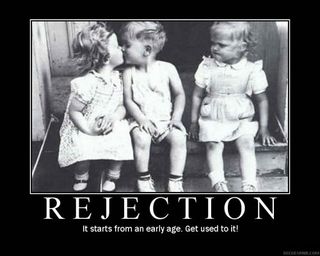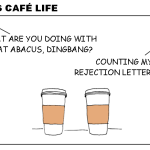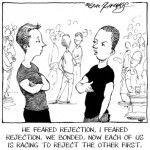“Social rejection occurs when an individual is deliberately excluded from a social relationship or social interaction for social rather than practical reasons. The topic includes both interpersonal rejection (or peer rejection) and romantic rejection. A person can be rejected on an individual basis or by an entire group of people. Furthermore, rejection can be either active, by bullying, teasing, or ridiculing, or passive, by ignoring a person, or giving the “silent treatment.” The experience of being rejected is subjective for the recipient, and it can be perceived when it is not actually present. The word ostracism is often used for the process (in Ancient Greece ostracism was voting into temporary exile).
“Although humans are social beings, some level of rejection is an inevitable part of life. Nevertheless, rejection can become a problem when it is prolonged or consistent, when the relationship is important, or when the individual is highly sensitive to rejection. Rejection by an entire group of people can have especially negative effects, particularly when it results in social isolation. The experience of rejection can lead to a number of adverse psychological consequences such as loneliness, low self-esteem, aggression, and depression. It can also lead to feelings of insecurity and a heightened sensitivity to future rejection” – Wikipedia
Being sent to Coventry isn’t a problem for me. I was born there and sent from Coventry hahaha. OK, enough with the jokes. Let’s crack on: What is rejection, other than abandonment in favour of others? It’s a symbolic process, implying we are inadequate for whatever reason. It has inspired a million metaphors:
- Cast away [anger] like spoiled milk —Marge Piercy
- Discarded like outmoded customs —Elyse Sommer
- Discarded (me) like yesterday’s underpants —Sue Grafton
- Dropped … like a dead fish —T. Glen Coughlin
- Dropped [from a list] … like a hot rivet —Loren D. Estleman
- He shook them [young women] off his back like a young stallion shaking off an unskilled rider —Russell Banks
- Keep at a distance, like someone with an infectious disease —Anon
- The many twists on this usually refer to a specific diseases, whatever is most feared. Like so many phrases that have been mainstreamed into our language, this can be traced back to a line from Shakespeare, in this case: “Barred, like one infectious.”
- Push her away like a clinging dog —Daphne du Maurier
- Push me aside like a kitchen chair —Philip Levine
- Put (such thoughts) aside like chewed-up grapeskins —Bertold Brecht
- Rejected [bad news] … like a transplanted organ —Pat Conroy
- Rejected [praise] like counterfeit money —William Mcllvanney
- Shoved aside like a row boat nosed away by a tanker —Mary Gordon
- Shun him like the plague —Charles Dickens
- Some men, like spaniels, will only fawn the more when repulsed, but will pay little heed to a friendly caress —Abd-el-Kader
- Spurn my passion like a worm —Jean Racine
- Swept her aside as if she were a cobweb —Susan Kelly
- They just dropped me … like a bag of potatoes —Njabulo Ndebele
- Threw aside everything … like a contemptible burden —Heinrich Böll
If there’s one negative emotion that motivates us more than any, that must surely be fear of rejection. Partly it’s that we want to be liked and loved for who we are and what we do, such that for many people would go out of their way to avoid situations that might result in their being rejected or equally to have to confront or reject another person ourselves – almost as hard as being hurt ourselves is to hurt somebody else, unless you have the skin of a rhino, though some seem positively to relish a form of sadistic malevolence and schadenfreude.
The greatest desire is surely to prevent that rejection occurring, but life being what it is we have to put ourselves out there and take the risk on a daily basis, knowing that there may be rejections small or large. Some we can handle, but others are nigh on impossible Maybe it is an ego thing, that the thought of losing face cannot be countenanced. Pride can indeed be a deadly sin, defined thus by Wikipedia:
With a negative connotation, pride refers to an inflated sense of one’s personal status or accomplishments, often used synonymously with hubris.
For most of us the greatest fear is pain and humiliation, but when faced with rejection there are people who react with uncharacteristic violence and hostility, maybe one explanation for the jealous behaviour of stalkers and those engaging in domestic abuse, especially when their partner leaves them but often without even that motivation. But you would hope that murder and violence are extreme reactions that could be prevented. Small scale rejections are the stuff of daily life, so we have to learn to deal with them or life would simply not be worthy living.
There are many situations when potential rejection might occur, but the two biggest by far are relationships and work. To be in a trusting relationship is brilliant, though it only takes one case of someone you love saying they are leaving you when you thought things were progressing perfectly to leave an enormous chasm suddenly opening at the centre of your life like an earthquake causing the ground to open up and swallow you.
Trusting again to the same extent becomes that much harder in future. Some people lose all naive hope and become embittered, world weary through endless rejections. A sad state to be in, but there is barely anyone who has not been touched by a broken heart at some point in their lives. The question is how you deal with it and keep at least some element of the innocent optimism that makes relationships worth the time and energy we invest in them.
As for work, the inevitability of the recruitment process means that no matter how well you scrub up, however dynamic your CV, whatever your gender, age or status, no matter what lessons you learn, you will be rejected multiple times before you are accepted – and each time you get the “thanks but no thanks” letter, or, more probably these days, a deafening silence, you will find it that tiny bit harder to get on and succeed next time.
You’ll go through the motions, sure enough, but the subtext of your application will be that you are slightly less inclined to believe you will succeed – one reason why it’s so soul-destroying being unemployed. Maybe it can’t be read so obviously on an application form, but it will certainly communicate at interview through non-verbal signals such as body language. It takes a truly determined soul to avoid being worn down by constant rejections and still come out smiling. But then, some of us are built of gritty stuff and won’t take no for an answer.
Maybe it’s about the propensity to take risks and willingness to look like a fool in order to get what you want, but then they do say successful entrepreneurs are likely to have failed four times before they succeed. Most people are content to work for an employer because the risk of failure is that much higher and having to sell yourself does not come naturally to many British people in particular. There are so many people who fail at something once then never try again for fear of failing a second time.
So what do you do about rejection? WikiAnswers solution is reprinted below, but for me dealing with rejection is about your own ability to persevere and stay positive. As the old saying goes, “don’t get mad, get even.” The way you do that is to find alternatives and do even better, learning lessons along the way. But that is easy to say and hard to do. An endless welter of rejections is bound to make even the thickest-skinned person question their own competence and desirability.
There’s an extent to which you have to identify what it is you are doing wrong and correct it, but sometimes it is simply that you’ve lost a competition for a job, say, at which someone who applied was simply a closer fit than you were. Questions that might be worth asking include whether you are applying for the right job to fit your skills and experience, especially if you have been on the market for a while and don’t have any immediate activity. Is there anything else you can do to increase your short-term chances of success?
Whatever the answer to those questions, it’s tough conducting your own post-mortem to see what you could do differently, but each time you have to draw a line and move on. Same with relationships: you might have to change some behaviours (personal hygiene, cleanliness of your home, embarrassing chat-up lines or anecdotes…), but there is no point dwelling on failures when you could be out there succeeding, believing in yourself.
So without more ado, here are the suggested steps for dealing with rejection of any sort. It’s not reported whether the same strategies work repeatedly, but what occurs to me is that it isn’t so very different from the approach I took to manage depression, recounted in my blog Black Dog. I hope you can draw the positives and find ways to manage the inevitable rejections life sends your way. For myself I’d say all the advice in the world when you suffer the pain of rejection will not act as consolation, and will often feel totally patronising. How fast you find ways back depends solely on you, nobody else.
Any kind of rejection, no matter if it’s in love, your career, friends, a book proposal or anything else, is not something that should affect how happy you are. Rejection doesn’t feel great and sometimes it feels unfathomable but it shouldn’t be something you permit to take away happiness from your life. The suffering that happens when rejection occurs comes from over-thinking the “loss” that you feel you’re suffering, be it loss of an opportunity, loss of a special relationship or loss of some other kind. The reality of life is that rejection will form a part of it––there will be occasions when your job application, your date request or your ideas for change will be rejected by someone, somewhere. It is a healthy attitude to accept that rejection is a part of life and to acknowledge that what really matters is finding the way to bounce back and try again.
Acknowledge that anyone can be rejected. Moreover, rejection is happening all around you, all of the time. In other words, you are not alone. Clearly, you’d have preferred that it didn’t happen but it has, yet no matter who you are, rejection will happen now and then. Trying to avoid it will limit your life’s experience, not improve it.
Allow yourself to feel bad initially. It is normal to feel bad, so don’t try to bottle up your disappointment and sadness. However, don’t allow yourself to feel this way for too long––you risk coloring your future endeavors with a negative impression if you start seeing this as something that will happen again, no matter what you do. You still have control, you still have an opportunity to learn from this experience and to approach the future wiser and more fortified.
Understand that ongoing feelings of sorrow are self-delusions. For example, if the rejection you’ve experienced is that someone has turned you down for a date, your continuing sorrow is a reflection of believing that you need that person in your life to feel happy. This isn’t true. Being around a person, talking to people, kissing a girlfriend––these are all just pleasures. They can certainly bring you temporary happiness, but they’re not permanent and they don’t define your own choices to be happy within. If you continue to think that these pleasures are what constitute true happiness, you will keep fooling yourself into believing that you should feel terrible because you don’t have the person or didn’t get the opportunity. This chase for a pleasure based solely on what you haven’t got can easily become an addiction that only brings you more sorrow in the long run.
Pleasures are temporary, they come and go and have no permanent place in your life. Understanding this will help you to understand that pleasures aren’t the source of your happiness. Being happy is an internal process, something that comes from within. By realizing that rejection isn’t loss of your inner happiness, you won’t make yourself suffer.
There are only two ways your mood can be affected by others. Either you could have been chosen to be with someone or to do something and you’ll add the pleasure of that experience to your already happy life; or, you’ll experience rejection, yet importantly, nothing will have changed in your existing happiness in life––brief disappointment is normal but your happiness level should remain constant.
Life is not about being sad and looking for things to make you happy. It’s case of being happy and taking part in pleasures that give you a boost to your already happy life.
Do not seek to avoid rejection and pretend it is something that you must learn to “live with”. When you free yourself from the delusions of need driven by external forces, you free yourself from the pain associated with rejection. Rejection does not cause pain, friend. Only you do.
Do not take rejection personally. This commonly stated phrase is not at odds with the fact that the rejection probably feels very personal. The point behind this sentiment is that you are often at the receiving end of something far more complex than what you’re able to ascertain. To you, it’s a simple case of a “no” to your request, proposal, hopes and dreams. To you, there may be weeks, months or years of planning, dreaming and readying yourself behind your request. And yet, there are still two sides to this tale: First, the person doing the rejecting is often unaware of the costs to you in terms of time, resources and energy expended. And even if that person is aware of this, you’re probably even less aware of what the person doing the rejection has to account for when reaching a decision to decline your request. For example, a person may reject your request for a date because he is still disentangling himself from a long-distance relationship that he doesn’t like to talk about openly. Or, an employer receives 5,000 equally excellent applications from people who have striven as hard and as bravely as you have and she has had to use very basic reasons for rejecting most of the pile in order to be able to cope with the influx of applications. Or, your oil painting might not have been accepted because the gallery has to account for ensuring variety for viewers between watercolors and oils and it had to take a tough decision because there was an imbalance of too many oils and not enough watercolors.
Often rejection is based in either the complexity of feelings of the decider or the complexity of the situation before the decider. It is more likely to be logistics, a need for simplicity, an inner uncertainty or a temporary lack of attraction that brings about rejection, as opposed to pure dislike of you or disbelief in your abilities, worthiness or acceptability. And even if you do find out that you’ve been rejected because your efforts are not up to a standard they need to be, this is not about your sense of worthlessness––it’s about needing to keep learning, experimenting and growing into your full potential. Do not make rejection into a case of questioning your own worth––that’s basically what it means to not take rejection personally.
Be careful if you’re a “they should” thinker. This style of thinking requires people to behave in a certain way, as in “they should recognize how brilliant/talented/extraordinary I am”. Leaving aside whether or not you’re actually doing enough to prove the things you feel others should be seeing in you, this kind of thinking gives away power––yours––to other people and leaves you in a position of relying on their acceptance of you for you to feel good about yourself. This slippery slope thinking style risks turning rejection into a regular occurrence in your life because you keep setting yourself up to be judged and found wanting.
Be conscious that many people feel bad when they have to reject a request. Few people reject requests from spite or for sheer entertainment.
If someone rejects you, respect his or her wishes and wish him or her only good in life. You do not need to completely avoid the person (or the organization, business, etc. of which this person is a part). The people who reject you are not a necessity to life, but this doesn’t mean you should hate them. Why? Because it will bring you more pleasure to wish good for others than to hate them. Try it. Hatred inflicts pain onto your own life and causes you to let the rejection take up residence in your head.
If you’re rejected by a person, do not blame or hate him or her, even if he or she was nasty about it. Once a relationship has ended or failed to fire, there is no point in crying and making a big deal about it, since you do not need it to feel happy. You may be disappointed that the opportunities with that person have failed to materialize, but realize you didn’t “need” the person to make you whole in the first place, you’ll find it much easier to wish him or her only good in life. You’ll feel much better (and saner) if you hold friendly feelings.
If your opinion does not change about the person, then there is no need to avoid him or her. If you still get some pleasure out of speaking to them, then why leave? It cannot hurt you if this person decides to not speak to you, because you haven’t missed out on the real happiness in your life. You’ve missed out on the temporary boost that being with this person would have given you.
Stay polite. Whatever else is going on inside of you, be polite externally. It won’t win you any favors to have an outburst or to insist in an intimidating way that the person rejecting rethink his or her approach. Politeness and patience will let people see your grace and determination to keep going.
void falling into the trap of living in hope that the person who rejected you will change his or her mind. There is nothing wrong with a faint hope that this may be the case but to be consumed by the possibility will cause you to put your life on hold and not progress on your own terms. Do not feel that you need the person to change his or her mind for things to turn right for you––you will only end up torturing yourself. If a person rejected you for a lack of attraction to you, that will likely not change and forcing it will only bring unhappiness. If a person rejected you because he or she didn’t feel that you fitted the corporate culture of the workplace, that’s unlikely to change if your CV is filled with the opposite of what they’re looking for. It’s best to simply accept that that opportunity is passed by and to move on, wiser in the knowledge of where you are likely to be more successful in making your future requests.
Review the possibilities. In some cases, you may have a lot of control over why you were rejected. For example, perhaps you were sloppy in the way you filled out a form, or perhaps you didn’t complete the right course to get promoted. In such cases, take the constructive advice that the rejection is offering and build on it to improve your lot. There is absolutely no need to sabotage your future––there are always things you can actively change. This includes such things as getting a job or promotion, sharing your portfolio around, nailing a team position and even relationships. And while you can’t change whether or not a person is attracted to you, you can definitely improve your own grooming and manners, which might just improve the other person’s feelings toward you. Even if it doesn’t, provided you do things to improve your own sense of well-being and confidence without relying on any person to bring you happiness, then you’ll attract more positive opportunities into your life.
Sometimes you need to ask why you were rejected, especially where there are no reasons given. Don’t be shy. If it’s a commercial transaction, anything from being accepted to business school to having your necklaces displayed at a craft show, there will always be people in charge to whom you can talk directly or by email. They may well give you tips or advice on what you need to do to improve your chances next time round. Most of all, don’t be afraid to ask them if they’re willing to coach or mentor you, or at the very least, to review your application/work/efforts, etc. before submitting or requesting next time. Most people are genuinely impressed by a person willing to learn and improve. (Just remember to be reasonable in how much you ask of others––everyone is busy.)
Try again. In most cases, it is worth trying again. Perhaps the main exception to this is in trying to force love––only try again to ask a person on a date if you’re sure that both of you have reached a greater understanding and awareness between one another and you’re approaching the new request with maturity and full acceptance that rejection may well be the outcome again. In the case of jobs, sales, applications, etc., trying again is usually the only way to get ahead.
Some clubs, jobs and the like will ask you if you have applied before. Don’t be dissuaded by such a question––it is only in the cases where the place makes it clear that “previous applicants need not apply” that they won’t give you a second chance. Even then you might do well to get hold of someone in charge and find out why this hurdle exists and how you can get around it. Tenacity should be your number one motivation when overcoming rejection.
Be aware that rejection is sometimes used as a filter to get rid of people who lack enthusiasm and determination. In some cases, the fact that you turn up and won’t take no for an answer will count very much in your favor!
Always remember, you do not need anything external to feel happy. Things can only bring you temporary happiness. The only permanent happiness is found in understanding this and in acknowledging the awesomeness of being alive.
Tips
- Know that if you get rejected in love and relationships, there is always someone else out there for you.
- Seek professional help if you keep feeling depressed after rejection. Alcohol or drugs won’t help.
- Most achievement and acceptance is about hard work. Sometimes we’re not as willing to admit to ourselves that we still have more work to do before we’re as polished as we need to be. Do be enthusiastic about your chances but also be realistic that there is still some learning and experience needed. Throw yourself into getting it sorted rather than pining over rejection.
- Even if you get rejected for something and try again, know that you may still get rejected once again. Life isn’t fair, but it’s not life’s circumstances which give you true happiness in the first place.
- Just because someone said no to whatever you are trying to get them to say yes to does not mean they don’t see the good in you, so rather than focus on the no shake it off and focus on the good in yourself if you cannot think of one than create one you would like to see in yourself and move on to the next prospect then once again focus on your strengths as an individual and you will find rejection gets less of you than more.
- If someone rejects you from love, it does not mean you should feel poorly of yourself or feel bad. It just means that they didn’t feel the attraction. And you cannot alter that.
- Never define yourself by what someone else thinks of you. We are all massively individual and have something completely unique to offer.
- Find a way to unwind after a rejection. Some people turn to their faith, others to a hot bath and meditation. Find ways to clear your mind, get over the bad feelings and restore your equilibrium.
- Rejection is just a case of you finding out that a particular person or organization was not interested in you, whether it is about love, work or some other pursuit in life. This doesn’t speak for the rest of the world, so do not assume that everyone else will act like this.
- Cry because crying is medicine for every pain. Crying will make you feel better.
Warnings
- If you keep taking rejection extremely personally, consider speaking to a counselor or therapist––if you are suffering from depression, anxiety or other mental health issues, you might not have the resilience needed to cope with life’s ongoing pressures and need added support. It’s nothing to be ashamed or afraid of––every person needs a compassionate guide in life now and then.
- In the case of trying to get a date, if the person who rejected you starts making “advances” on you after he or she has rejected you, but he or she still does not want to see eye to eye with you by being partners or getting more deeply involved, you have to ask yourself if you enjoy simply the flirting pleasures. Many people will not get any pleasure out of it because they know it will not lead anywhere. If you find yourself to be one of these people, then express your disinterest to the person. If things get out of hand and he or she refuses to become intimate with you, but keeps on flirting with you, and you still find no pleasure in the flirting, you may want to break off contact with that person because you find no pleasure in being with him or her. This does not mean you wish bad for the person; it’s about self-protection and keeping things real.
- People won’t always get back to you when you ask for feedback on rejection. That’s life––sometimes they’re too busy, other times they’re at a loss for words as to how to explain something in a way that won’t sound too critical or personal. And sometimes, they truly can’t be bothered. Again, don’t take it personally––see if you can find someone else you trust and who does have time to go over what happened with you, to try and see how to make future improvements.













